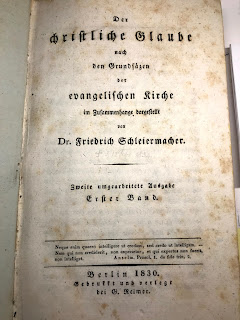Antiquarian Theology Books
In a post dating back to almost seven years ago, I detailed an experience of acquiring two antiquarian books from a bookstore that, by now, has disappeared into the annals of local memory and history. As someone who is not Unitarian or not completely persuaded by Anglican/Wesleyan spiritualities, I did not turn to those books, Sermons of the Late Rev. J.S. Buckminster (1814) and The Posthumous Pieces of the Reverend John Williams de la Flechere (1794). They were also in poor condition, which was perhaps why I was able to procure both for $5 each. However, they had interesting histories. The 1814 book, for example, was owned by Frank Taussig, who was professor of economics at Harvard University and chaired the U.S. Tariff Commission (1917-1919), which was the predecessor of what is today the U.S. International Trade Commission. In the experience of owning two books, I appreciated the feeling of being connected to previous owners and understanding how I am a custodian not just of the content of the book or the book itself, but also the memory of previous owners.
I recently acquired three books, fortunately not because of a local bookstore's closing. Ordinarily, those who are truly interested in the rare/antiquarian book trade would go for the first editions, but unlike most antiquarian book traders, I intend to use the books. I speak of three books (well, 2 - the second was published in 2 volumes) written by the German theologian Friedrich Daniel Ernst Schleiermacher, who is rightly called the Father of Modern Theology (or, more confusingly, the Father of Liberal Theology).
 |
| Über die Religion (orig. 1799, 4th ed. 1831) |
 |
| Der christliche Glaube (orig. 1821, 2nd ed. 1830) |
I have been reading some English translations of Schleiermacher's works,
but English is a relatively poor language to completely encapsulate the
subtleties of French, Chinese, and German (among others, I'm sure).
The translation of Gefühl, for instance, has been rendered as "feeling." This is not wholly wrong, but it gives Schleiermacher the sense of someone who grounds his theological system in some sort of personal, subjective gut feeling about spirituality or religiosity. I think this definition makes his theology too easy to dismiss, not to mention it's not what he was getting at, and has a risk too of applying our epistemological constructs on someone who has not lived in a world in which Nazi Germany was history, among others. The way I think to get closer to what he was getting at was to understand that Schleiermacher had a Moravian upbringing - something which is better encapsulated in Wesley's idea of his "heart strangely warmed." One could criticize Wesley of course, for just about anything from our children to Hitler/Trump could cause anybody's heart to be "strangely warmed." And that criticism would apply to Schleiermacher too. But Schleiermacher was getting at this "sense", this innate intuition and affect that leads to the Gefühl der schlecthinnigen Abhängigkeit, a feeling of awareness and absolute dependence on God. In a way, it is a very unique bringing together of Wesleyan and Reformed strands of theology. Sure, doctrine matters, but doctrine alone does not bring one closer to God. Christianity that matters is one in which God matters deep in our hearts.And because God matters, we realize that we need God absolutely.
I won't go any further with his theology because my point in this post is to talk about the books. Anyways, I figured that since a modern German text of both would easily run me into the $70+, I might as well look into the used books, and fortunately for me, Schleiermacher's books weren't as expensive as Calvin's Institutio Christianae Religionis. In fact, you can find online the first editions of Über die Religion and Der christliche Glaube for less than US$300 (although, you need to pay attention to the condition of the books). Because I intended to use them, and my English translation uses the 1830/1831 second edition, I looked for that. And I got it for a total of US$100. While $5 would've been a steal, the bookstore was not closing down. So there. Über die Religion was about $25, which is cheap because my Cambridge annotated edition of On Religion was $42.
Most interesting in these books were not the title pages, but who owned them before me. In my copy of Über die Religion, a "P. Buttmann" owned it. Now, I turned to the infallible source of knowledge today - Google - and found out there was a Philip Karl Buttmann, an eminent Greek scholar at the University of Berlin. However, he passed away in 1929, two years before my edition of the book was published. However, his son, Philip Buttmann lived during this time (1809-1901) and was a pastor of two Berlin churches. In 1831, he would've been training to be a minister or something like that. While I couldn't verify this in all certainty, it was interesting to think of the possibility that an eminent pastor owned the book first, and then maybe a few others before it became my turn. I look forward to using it gently but frequently.
Unfortunately, I do not recognize the name of the previous owner of Der christliche Glaube. From what I could make of the signature, it seems to say "W Daners." Google was unable to find anything to that effect. Was it Wilhelm Daners? Wolfgang? And was it Daners? (That "s" looks a bit odd.) Anyways, I leave it here on my post for you, dear reader, to chance it out and see what you can get from it. I expect to treat it like my copy of Über die Religion: frequently but gently.

Comments
Post a Comment